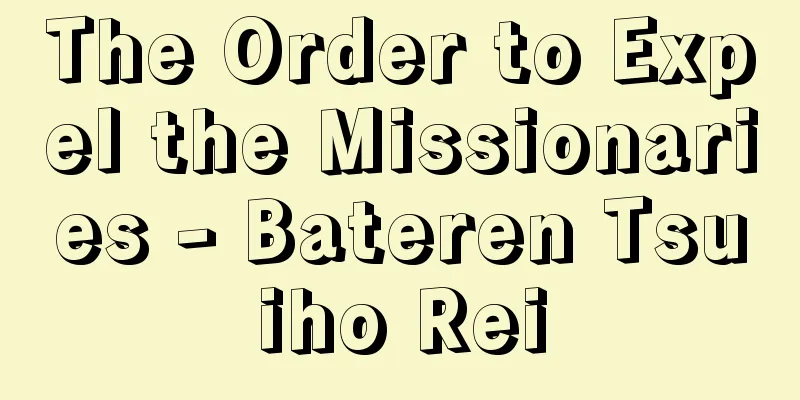Caliph - karifu (English spelling)

|
A term used in Islamic political science to refer to the supreme leader of Islamic society after the death of the Islamic prophet Muhammad (Mohammed). In Arabic, it is called khalīfa (successor, representative), and caliph is the English pronunciation of that. In reality, the supreme leader is often called "Head of the Faithful" (Amir al-Mu'mineen), and there are not many examples where the title caliph is used. The first four caliphs were called the orthodox caliphs, meaning caliphs guided by God, and their period is called the orthodox caliphate period (632-661). This was followed by the Umayyad dynasty (661-750), in which the Umayyad family monopolized the caliphate, and then the Abbasid dynasty (750-1258), in which the Abbasid family monopolized the caliphate. From the 10th to 11th centuries, the Fatimid and Umayyad rulers also claimed the title of caliph in opposition to the Abbasid caliphs, and three caliphs coexisted in the Islamic world. After the fall of these two dynasties, Islamic dynasties that were essentially independent in various places recognized the authority of the Abbasid family as caliphs, but after the fall of the Abbasid dynasty, this title lost its practical meaning. From the end of the 19th century to the time of World War I, the Ottoman Turkish emperor tried to unite all Islamic forces by calling himself caliph, but failed. [Akira Goto] [Reference] |Source: Shogakukan Encyclopedia Nipponica About Encyclopedia Nipponica Information | Legend |
|
イスラム教の預言者ムハンマド(マホメット)没後の、イスラム社会の最高指導者をいう、イスラム政治学での用語。アラビア語ではハリーファkhalīfa(継承者、代理人)といい、カリフはその英語なまりである。実際の最高指導者は「信徒の長(アミール・ル・ムーミニーン)」と称することが多く、カリフという称号が用いられた例はかならずしも多くない。 最初の4代のカリフは、神に正しく導かれたカリフという意味で正統カリフとよばれ、その時代は正統カリフ時代(632~661)とよばれる。ついでウマイヤ家がカリフ位を独占するウマイヤ朝(661~750)、さらにアッバース家がカリフ位を独占するアッバース朝(750~1258)と続いた。10世紀から11世紀にかけての時期は、アッバース家のカリフに対抗して、ファーティマ朝の君主と後(こう)ウマイヤ朝の君主もカリフを称し、イスラム世界に3人のカリフが並存する時代であった。その両王朝が滅亡したのちは、各地で実質的に独立していたイスラム王朝は、アッバース家のカリフとしての権威を認めたが、アッバース朝滅亡後はその実質的な意味を失った。19世紀末から第一次世界大戦の時代に、オスマン・トルコ皇帝がカリフと称して全イスラム勢力の結集を試みたが失敗した。 [後藤 明] [参照項目] |出典 小学館 日本大百科全書(ニッポニカ)日本大百科全書(ニッポニカ)について 情報 | 凡例 |
>>: Potassium fertilizer - Karihiryo
Recommend
Albergo dei nobili (English: albergo dei nobili)
…the Genoese albergo was a family association of ...
Herrick, Robert
Born April 26, 1868 in Cambridge, Massachusetts. [...
Iranology; Īrānshināsī
Academic field that aims to comprehensively unders...
Dynamic symbols - Dynamic symbols
〘noun〙 In Western music, a symbol that indicates t...
Environmental World
…He had close ties with such notable figures as R...
Hesiodos - Hesiodos
Date of birth and death unknown. Ancient Greek ep...
Noble gas (English spelling)
...This is because the electron configuration of ...
Dokkoishi - Dokkoishi
A polished or hammered stone tool similar in shap...
Nagano [city] - Nagano
Nagano City is located in the northern part of Nag...
Rafael del Riego y Núñez
1785‐1823 Spanish soldier, liberal and patriot. He...
Guardianship - Guardianship
〘noun〙[一] (a phonetic reading of " guardian&q...
Rocky Mountain spotted fever
It is also simply called Rocky Mountain fever. It ...
Esan - Esan
A double volcano (→ composite volcano) located on ...
Yellow Ting Jing (Huang Ting Jing)
Taoist scriptures. Generally, it is a collective t...
Patriot
...The democrats demanded democratic reforms and ...









